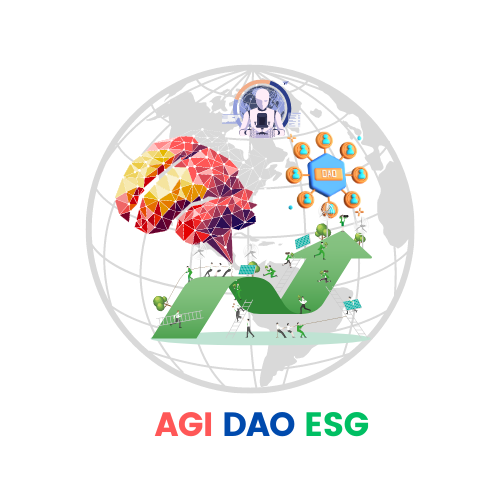A unified approach that merges the concepts of Artificial General Intelligence (AGI), Decentralized Autonomous Organizations (DAOs), and Environmental, Social, and Governance (ESG) criteria has the potential to revolutionize the way organizations operate. This intersection of technology, organizational structure, and sustainability presents a fascinating opportunity to create intelligent, decentralized organizations that prioritize ethical and sustainable practices.At the core of this unified approach is AGI, which refers to machines or systems that possess general intelligence and can perform tasks that would typically require human intelligence. AGI has the potential to enhance decision-making processes by analyzing vast amounts of data, identifying patterns, and making informed choices based on predefined criteria. By integrating AGI into organizational structures, companies can leverage its capabilities to make decisions that align with ESG criteria.DAOs, on the other hand, are organizations that operate through smart contracts on a blockchain, allowing for decentralized decision-making and eliminating the need for traditional hierarchical structures. DAOs provide a framework for transparent, accountable, and participatory decision-making, where stakeholders have a say in the organization’s operations. By combining AGI with DAOs, organizations can create intelligent, decentralized entities that operate based on ethical and sustainable principles.ESG criteria encompass environmental, social, and governance factors that organizations consider in their decision-making processes. Environmental criteria focus on minimizing negative impacts on the environment and promoting sustainability. Social criteria address issues such as diversity, labor practices, and community engagement. Governance criteria emphasize transparency, accountability, and ethical practices within an organization. By integrating ESG criteria into the decision-making processes of AGI-powered DAOs, organizations can ensure that their operations prioritize environmental protection, social equity, and good governance.The integration of AGI, DAOs, and ESG criteria offers several potential benefits. First, it allows organizations to make more informed decisions by leveraging AGI’s analytical capabilities. AGI can analyze vast amounts of data, identify patterns, and provide insights that can inform decision-making processes. This can lead to more effective and efficient operations, as well as better risk management.Second, the decentralized nature of DAOs promotes transparency and accountability. By operating on a blockchain, DAOs provide a public ledger of all transactions and decisions, ensuring that stakeholders can verify the organization’s actions. This transparency fosters trust among stakeholders and reduces the risk of unethical or unsustainable practices.Third, the integration of ESG criteria ensures that organizations prioritize ethical and sustainable practices. By considering environmental, social, and governance factors in decision-making processes, organizations can minimize their negative impact on the environment, promote social equity, and uphold ethical standards. This not only benefits the organization itself but also contributes to the overall well-being of society and the planet.In conclusion, the integration of AGI, DAOs, and ESG criteria presents a fascinating intersection of technology, organizational structure, and sustainability. By combining these concepts, organizations can create intelligent, decentralized entities that operate based on ethical and sustainable principles. This unified approach has the potential to revolutionize decision-making processes, promote transparency and accountability, and prioritize environmental protection, social equity, and good governance. As technology continues to advance, exploring the possibilities of this intersection becomes increasingly important for organizations seeking to thrive in a rapidly changing world.
The Intersection of Artificial General Intelligence, Decentralized Autonomous Organizations, and ESG Criteria
/

Leave a Reply